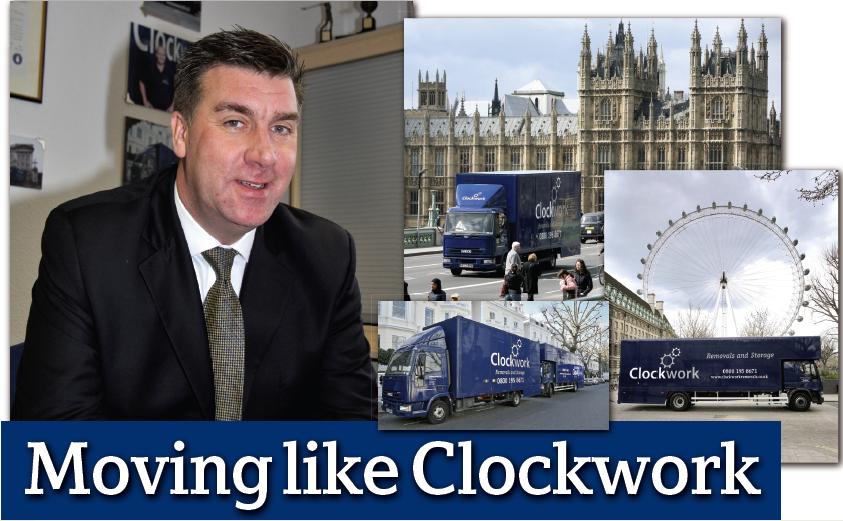An interview with Simon Osborne, the new MD of the UK’s most predatory mover.

Rightly or not, predatory is probably not too strong a word for the way Clockwork has been viewed in the moving business since it started on its extraordinary rise in 1996. Today, however, things are different. It’s more about consolidation and making the best use of the assets it has to ensure every opportunity is maximised and every effort focussed. That’s why Simon Osborne has joined the company.
Simon confesses that he’s not a “pipe and slippers” man. He likes a challenge, acknowledges that there is work to do at Clockwork, and has plenty of experience to draw upon to make it work.
Simon started his career with Lex Transfleet in Yorkshire, later owning a logistics company. In 1999, however, he left logistics behind, moved south and joined Cadogan Tate in London as the General Manager of the company’s Acton Lane site. He stayed with the company until 2006, becoming its managing director, before buying Baxters from Fred Baxter the following year. The problems that ensued have been well documented and don’t need to be repeated here but, suffice to say, by 2010 Simon changed the company’s name to Momentous.
“People assumed that it was a family business and thought they could talk to a Mr. Baxter,” said Simon. “It also gave us a new identity which brought the company up to date.” Momentous was and remains a secure and profitable business but Simon soon started looking for something new to exercise the grey matter. Around that time he was approached by Courtenay Morison to take over the role as MD of Clockwork. Encouraged by David Osborne, his brother and the depot manager of the London Head Office, and whilst retaining a financial interest in Momentous, in August 2012 he accepted.
“Clockwork didn’t have the best reputation,” he admitted. “It grew very quickly with an aggressive approach in the early days and, I suppose, stepped on a few toes. Courtenay Morison, the business owner, had a plan to build his portfolio and grow his business. He wanted to buy a business and move on. He was very forthright in getting things done,” said Simon.
Come the recession something had to give and, as properties were re-valued, and banks reduced their lending, so the acquisition spree had to stop. “When you are used to buying businesses, but businesses are not selling, you can become a bit tired of your own pace, which can become frustrating. The company is still looking at strategic acquisitions but every deal is approached with rigour and considered analysis, the good old days of impulsive decision making have long gone.
Some of the businesses were doing fine; some were less so. After a process of reorganisation by the company it now has eleven branches and Simon is in the process of creating a much more structured feel about the organisation.
“We have some very enthusiastic depot managers,” said Simon. “They have a great deal of passion and are very focussed. But they run as eleven different businesses and my job is to bring them together into a more coherent whole.”
The key to bringing the company together, Simon feels, is to provide opportunities for the depot managers to get together more. “Some hadn’t met each other until recently. We need to develop a more company-wide approach while not losing the benefit of the strong local depot manager who really understands his local customers.”
Simon feels that the relationships that will be formed because of a closer-knit management will be immensely beneficial both in terms of the co-operation that it will create and the natural trust that develops between colleagues who know each other well. “It’s a complete cultural change. We want them to focus on running their local business but also have one eye on national opportunities. We will work together to capitalise on them and will also be working centrally to develop national contracts that will benefit the whole group.”
This approach will also allow the economies of scale to be better used such as the utilisation of assets such as vehicles and staff. “We want our managers to look closely at their fleets and work together so see how they can cooperate. Also our workforce needs to have further training programs in order that we maintain a common standard so that everyone in the organisation can have confidence about the quality and consistency of the work we do.” This approach eliminates weak links in the organisation and improves morale as people see they are valued and managed efficiently and with care.
The long term plan for Clockwork will be to expand its services into the international and European sectors of business, with partners, as Simon feels that it is currently focussed mainly on the domestic and commercial markets. This inevitably means the wearing of much shoe leather at IAM meetings and the like, but he sees no better way of getting the name around than face-to-face meetings with industry partners. “We have six branches in Scotland giving us tremendous coverage. We need to get our message across to our international partners that if they are consigning to Scotland, they should be using Clockwork.”
Simon is very positive about his future at Clockwork and has been impressed by the company and its people. “I genuinely believe in this business otherwise I wouldn’t have come here,” he said. “I want to pull away the curtains to show what can be created.”
Read the editor's next pick